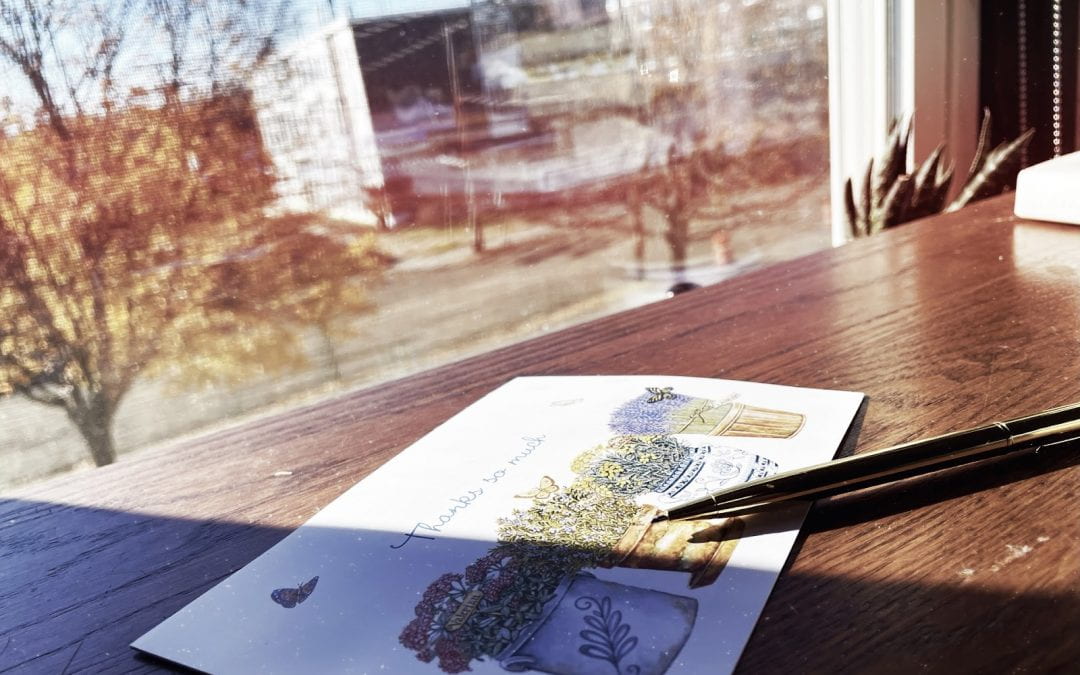
The Power of Gratitude, Why you should start writing more letters.
by Angie Tehuitzil Corral, staff writer
Thanksgiving season is around the corner, and it is the time of year where there is a certain sense of warmth and fullness as we are all thankful for what we have and the loving bonds we share with our family, friends, partners, etc. – being grateful is simply a part of the season.
Last week my psychology professor informed my class of a group of studies happening on campus, and as a psychology major, I was highly interested in volunteering. Although I appreciated all the studies conducted, one stood out, and I had discerned that my attitude had changed positively.
The study was The Practice of Gratitude, done by researcher Seán Tenney, a second-year UMF student majoring in psychology. It was a 20 minute experiment in which Seán began with discussing the psychology of gratitude and then began with participants completing a personal well-being questionnaire that would serve as pre and post-tests results for the experiment. After the pre questionnaire, participants had to write a letter within 5-8 minutes to someone they hadn’t properly given them the gratitude they deserve.
There is no denying that when I first received the paper, I was clueless about who I’d write it for, but it wasn’t long until the letter wrote itself. My verdict after the research was that I had unraveled a profound depth of happiness. The effect that the study had on me invested me in wanting to know more about it. So I decided to meet with Seán.
The study conducted was for his Psych 400 class, with his finalized hypothesis: “participants who write a message of gratitude for someone in their life who they haven’t adequately thanked will experience a positive increase in multiple dimensions of personal well being”.
I further asked Seán what his inspiration behind this study was as I was fascinated by how well-planned and effortless the experiment went. However, Seán revealed that it wasn’t easy, as he was initially distressed about what his study would be, but then found himself genuinely influenced by a memory from three years ago. A wearying night in which he encountered an old yearbook; it possessed an astonishing message from a former classmate with whom he didn’t have much connection.
“From the end of October to early November, I just felt detached, disconnected, and even questioned my life, but the letter from this former classmate was a moment of transformation; the kindness of her words grounded me back to earth and I barely even knew this person,” said Seán.
Seán then decided to send a touching message to his classmate, expressing to her that such a simple yet “compelling gratitude message in black ink” had enlightened him. And this hasn’t ended for Seán as he continues sending letters to various people.
Other studies have proved measurable benefits, showing the positive psychology behind an act of gratitude through its impact being the “most effective psychological and spiritual practices for enhancing overall well-being”. For example, a group of researchers who had done a similar experiment as Seán in a University in the Midwest concluded that “one of the greatest gifts is giving” and explained many underestimated self benefits. Practicing such a small act increases energy by boosting well-being behaviors -such as finding and influencing better care for one’s body, making smarter daily decisions, having better social relationships, being a more optimistic person, and it’s even the healthiest form of treatment that has a substantial influence on those with mood disorders. Even through Seán’s interpersonal experience, we can see that being grateful not only uplifts the person you’re being thankful to but also helps with your own welfare.
I encourage you to partake in this research by simply writing a gratitude letter. Even if you don’t give it to the person, keep it as an inspirational reminder of why you work as hard as you do. We spend most of the time thinking about what we don’t have, but happiness doesn’t mean having everything; instead, it is about being thankful for what you have and those who have made it possible for all that you’ve acquired.
Sources
https://journalppw.com/index.php/JPPW/article/view/256/99
\https://time.com/5026174/health-benefits-of-gratitude/